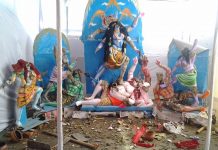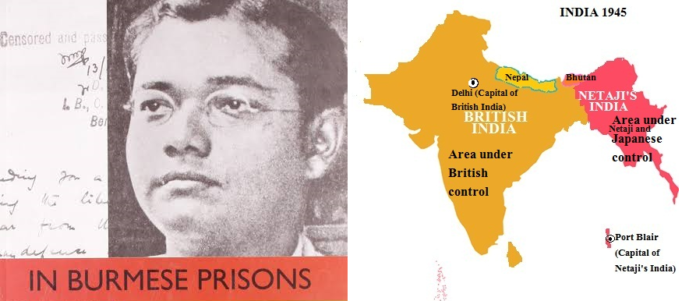On the occasion of 125th birth anniversary of the greatest freedom fighter of India who didn’t leave any stone unturned to shake British empire it should be our solemn resolve to look into extraordinary life of Subhas Chandra Bose, the beloved Netaji of all Indians, keeping aside the ugly political battle over legacy of Bose going on between BJP led central government and TMC led West Bengal government.
Netaji was one of the finest products of contemporary Bengali intelligentia. His esse was not an isolated one rather a culmination of best thoughts that came into being in the 19th century Bengal through Raja Rammohan Roy, Ishwar Chandra Vidyasagar, Bankim Chandra Chattopadhyay, Swami Vivekananda and many others. Hindu nationalist revolutionary activities of secret societies like Anushilan Samiti, Jugantar highly influenced Bose. Rishi Aurobindo was a key figure behind Jugantar for which he was imprisoned. Bose himself was instrumental in setting up Bengal Volunteers, another such outfit to advance armed struggle against the British.
In an account in his memoirs ‘An Indian Pilgrim’ written in 1937, Netaji relates the influence that Sri Aurobindo had on him. As a college student it was not the mysticism surrounding Arabindo’s name which attracted Netaji, but the former’s writings and also his letters. Aurobindo was then editing a monthly journal called ‘Arya’ in which he expounded his philosophy. In one such article Aurobindo wrote, “We must be dynamos of the divine electricity so that when each of us stands up, thousands around may be full of the light – full of bliss and Ananda.” Netaji and his companions felt convinced that spiritual enlightenment was necessary for effective national service.
The reconciliation between the One and the Many, between the God and the Creation, which Sri Ramakrishna and Vivekananda had preached, had indeed impressed but had not till then succeeded in liberating him from the cobwebs of Maya (the theory that the world is an Illusion). In this task of emancipation, Rishi Aurobindo came as a helping hand to Netaji. He worked out a reconciliation between the Spirit and the Matter, between the God and the Creation, on the metaphysical side and supplemented it with a synthesis of the methods of attaining the truth – a synthesis of Yoga, as he called it.
As Netaji described vividly, “Thousands of years ago the Bhagavad Gita had spoken about the different Yogas – Jnana Yoga or the attainment of truth through knowledge; Bhakti Yoga or the attainment of truth through devotion and love; Karma Yoga or the attainment of truth through selfless action… Vivekananda had no doubt spoken of the need of Jnana (knowledge), Bhakti (devotion and love) and Karma (selfless action) in developing an all-round character, but there was something original and unique in Rishi’s conception of a synthesis of Yoga. He showed how by a proper use of the different Yogas one could rise step by step to the highest truth.”
Sri Aurobindo in his famous Uttarpara speech proclaimed that Sanatana Dharma is true nationalism. Netaji believed if India wishes to become a world power then spreading Sanatana Dharma across the globe would be beneficial as a prerequisite. When he was put behind the bars in Burma in 1926 he wrote on ‘aggressive Hinduism’ as the soft power of India, along the lines of Sister Nivedita. He gave example of Africa where only two religions were dominant then – Christianity ans Islam. He was an admirer of Swami Vivekananda’s effort in advancing Hinduism in the West. Similarly he thought of bringing ’20 million Africans into Hindu fold so that India’s influence in the second largest continent will be widened.’
Swami Vivekananda had sent Swami Abhedananda to head the Vedanta Society of New York in 1897, and spread the message of Vedanta. There he preached messages of Vedanta and teachings of his guru Ramkrishna Paramhansa for about 25 years, traveling far and wide to the United States, Canada, Mexico, Japan and Hong Kong. Finally, he returned to India in 1921. Paramahansa Yogananda was driven by a divine vision and his guru Yukteshwar Giri’s inspiration to move to the United States in 1920 where began spreading the message of Sanatana Dharma. He embarked on the cross continental tour in 1925, gathering a huge following and established centres of his Self-Realization Fellowship in both the East and West coasts. These successes must have shaped Netaji’s vision of India as a superpower by means of global Hinduism.
Sarat Chandra Chattopadhyay whom the nation mostly knows as creator of iconic character Devdas stated in a speech called ‘Bartaman Hindu Musalman Samasya’ in 1926, “Hindusthan is country of Hindus. So liberating this country from chains of colonial slavery is sole responsibility of Hindus. Muslims have turned their face towards Arab and Turkey. Their hearts are not present here.” The spiritual motivation behind the freedom struggle among the vast majority of the Hindu freedom fighters including Netaji and the general lack of participation of the Muslims in it substantiates Sarat Chandra’s hypothesis. Netaji, however, managed to incorporate a number of Muslim PoWs from the British Indian Army into the Azad Hind Fauj upon the fall of Singapore to Imperial Japan.
If Netaji’s war campaign became a fruitful one he would have undoubtedly become India’s first Prime Minister. His Hindu perception of building the nation would be very different from Jawahar Lal Nehru’s westernized ‘unIndian’ way of building India. Netaji was not averse to socialism but he also believed that India had to adopt socialism not from Marxism but from its history and tradition. He rejected communism for being too materialistic which in his opinion reduces a human being to a stomach filling entity only like a beast.
Netaji’s herculean effort to kick out British was looked upon with apprehension by then Muslim League leaders. Sheikh Mujibur Rahman, the passionate Muslim Leaguer who later became founding father of Bangladesh was so worried about Netaji’s military success that feared Pakistan won’t happen if Azad Hind Fauj manages to liberate India from the British. He wrote in his unfinished autobiography, ‘Asamapto Atmojiboni’ (Incomplete Autobiography), “If Subhas Bose comes back, Pakistan won’t be possible at all. What will happen to 10 crore Muslims then?”
Pakistan became not just the homeland for 10 crore Muslims of India, when it was born it was the biggest and arguably the most powerful country in the Muslim world. Forging a strong alliance with the West and China, it became the spearhead of the Islamic block. The establishment of Pakistan was the consolidation of the centuries of Islamic occupation in India, a regrouping of the Abrahamic force in it’s civilization clash with Indic culture.
It’s not surprising therefore that Netaji’s spiritual vision of India as a world leader would unnerve the Muslim Leaguers. That his thoughts were aligned with the eternal vision that the ancient Indian sages held, that his actions were inspired from the spiritual motivation he drew from the modern sages of Bengal Renaissance and that he was on the right path to building a strong future India is vindicated in the fear and apprehensions in the ranks of the forces that have sought to break India.



































